Living in Haiti, he continues to produce films on social struggles, Haitian history and culture, human rights, women’s issues, and the environment
Arnold Antonin, whose real name is Celesti Corbanèse, has directed a total of 76 films up until 2024, including feature films, short films, fiction, and documentaries.
Living in Haiti, he continues to produce films focusing on social struggles, Haitian history and culture, human rights, women’s issues, and the environment.
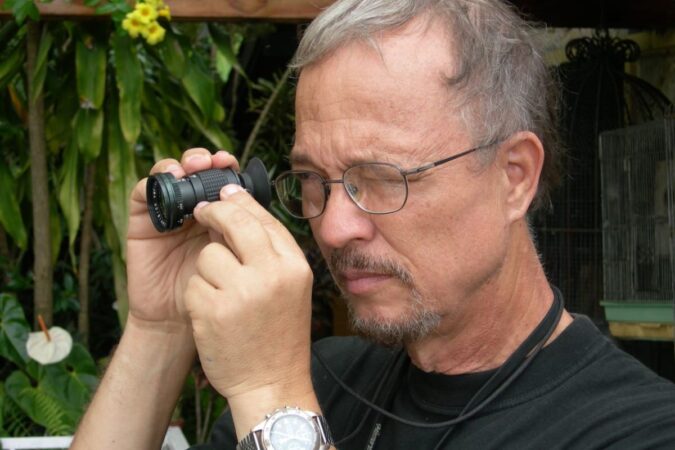
Arnold Antonin during the filming | ©Arnold Antonin Family Archives
His last film released in 2024 entitled « Anténor Firmin, between the sword and the pen or the equality of human races, » recounts the life and commitments of the 19th century Haitian anthropologist and politician.
“I continue to believe in the potential of cinema as a tool for memory, education, and expression,” Antonin confides to AyiboPost.
The Port-au-Prince native born in 1942 marked his entry into cinema with « Haiti: The Way to Freedom« considered the first Haitian feature film released in black and white in 1975, while he was in exile.
This 120-minute documentary traces the long struggle against oppression from Christopher Columbus’ arrival to Jean-Claude Duvalier, through the resistance of the Tainos to the victory of Dessalines’ national liberation army over Napoleonic troops in 1804.
In 1974, the filmmaker had already made his first short film entitled « Duvalier Accusé,« a black and white work lasting 20 minutes.
The Port-au-Prince native born in 1942 marked his entry into cinema with « Haiti: The Way to Freedom, » considered the first Haitian feature film released in black and white in 1975
To escape the repression of the Duvalier regime and protect his loved ones, he adopted the pseudonym Arnold Antonin to make and publish films.
After participating in the student strike launched in 1960, one of the longest in the last 30 years in Haiti, Arnold Antonin found himself on the Duvalier dictatorial regime’s blacklist of enemies.
In 1961, he left the country to go into exile in Italy at the request of his mother, concerned about the consequences that could result from his participation in this strike.
His mother will, in turn, find herself on the regime’s blacklist.
Arriving in Italy, Antonin began university studies in political science.
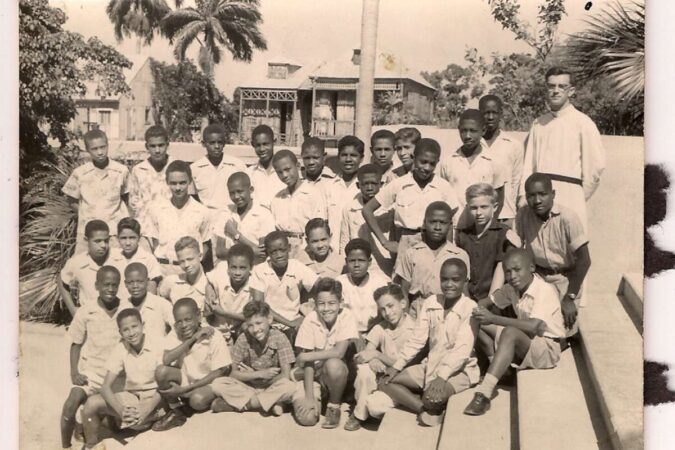
Arnold Antonin in the second row, in 6th grade at Collège Saint Martial, Port-au-Prince, 1955. | ©Arnold Antonin Family Archives
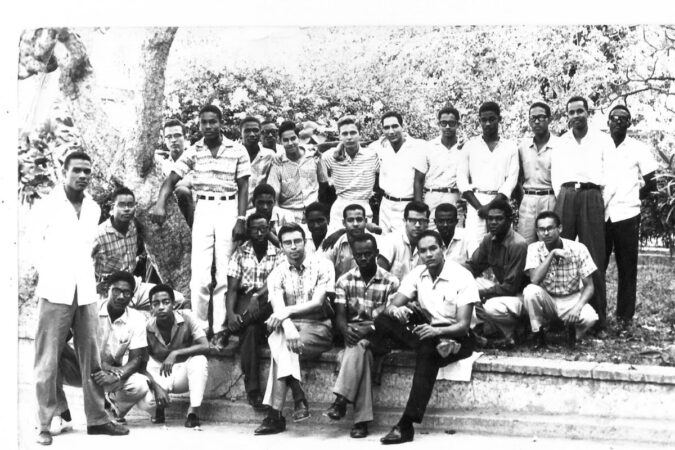
Arnold Antonin’s senior year at Collège Saint Martial in 1961, in Port-au-Prince. | ©Arnold Antonin Family Archives
A year later, he abandoned this discipline to focus on economics, where he obtained his doctorate in 1971.
Antonin remained in exile for more than 20 years before returning to Haiti following Jean-Claude Duvalier’s departure in 1986.
Upon his return to the country, he taught for 10 years at the National School of Arts (ENARTS) and at the Faculty of Human Sciences of the State University of Haiti.
Other ventures will mark his return.
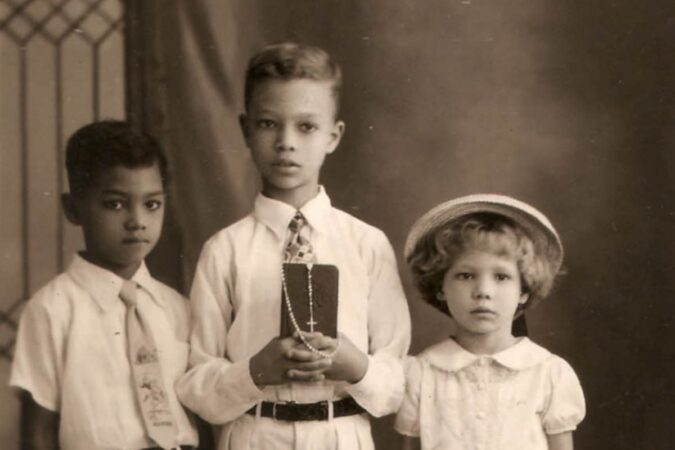
Arnold Antonin at the age of 10 among his brother and sister during his first communion, in Port-au-Prince. | ©Arnold Antonin Family Archives
For example, he created the Pétion Bolivar center, launched the Thursday Public Forum – a pluralist space for meetings and debates – and set up the national network for the defense of human rights (RENADWAM) with the aim of uniting Haitian human rights organizations.
Long before his exile in Italy, Arnold Antonin was interested in the education and illiteracy issue, which he saw as one of the country’s greatest challenges.
He considers founding a literacy school as his first significant achievement in the country before his departure.
A momentum, he says, that was interrupted.
Because, he explains that at the time, “a minister of the Duvalier regime declared that literacy could indoctrinate the population and nourish revolutionary ideas causing them to lose power.”
His path crossed that of cinema from a very young age.
As a child, he already considered himself a movie buff.
“One day I won the lottery. I gave the money to my mother who gave me part of it. I remember using this money to go to the cinema,” confides the man whose father died when he was 8 years old.
At the time, Port-au-Prince had a dozen movie theaters, including Paramount Ciné and Rex Théâtre.
“During my vacation in Petite-Rivière de l’Artibonite with Paul and Hérard, two important people in this town, I spent my evenings watching 16 millimeter films projected regularly in a theater located very close to their houses, » he continues.
Antonin’s passion for cinema stems from his love of comics. An art form he feels is often overlooked in Haiti.
At the time, Port-au-Prince had a dozen movie theaters, including Rex Théâtre and Anba Tribune.
For the filmmaker, Haitian cinema is full of incredible narrative opportunities. Which, according to him, justifies his interest in producing films on Haiti.
“The history and reality of the country offer unique cinematographic scenarios. Sometimes I think we could capture scenes that are already worthy of a film just by placing a hidden camera somewhere in Haiti,” he told AyiboPost.
According to Antonin, Haiti is going through two great madnesses: a destructive madness, fueled by predators hungry for money and power, and a creative madness, driven by the positive energy and talent of Haitians.
“Even in extreme poverty, Haitians manage to create beauty. Street sculptors are a perfect example, they show talent comparable to that of formally trained artists,” he says.
Another element that has always captured his attention, and which constitutes another source of positive energy, are those he calls “everyday heroes”.
For the filmmaker, Haitian cinema is full of incredible narrative opportunities. Which, according to him, justifies his interest in producing films on Haiti.
“These people live in subhuman conditions, but they have life plans. They not only aspire to live with dignity, but also want their loved ones to lead better lives. I often wonder where they find this courage,” he explains.
This admiration inspired him to make a film about two women, two stone crushing sisters, a task formerly reserved for prisoners sentenced to forced labor.
This 17-minute short film entitled « Women’s Courage« produced in 2000, tells their story and highlights their daily struggle to survive in the country.
For Antonin, cinema must be seen as a tool of memory and transformation.
He cites as an example two of his films, « Can sculpture save the Village of Noailles? » released in 2009. Following its release the artisans of this artistic village were able to find funding to rebuild their workshops.
The latter, located at Croix-des-Bouquets, were destroyed by armed bandits in 2022.
Cinema must be seen as a tool of memory and transformation.
Another feature film titled « Le Président a-t-il le SIDA? » released in 2006, had an immediate impact and contributed to the fight against HIV/AIDS in Haiti.
This film won the prize for best feature film by the Haitian diaspora at Africa’s biggest film festival in 2007.
Arnold Antonin has won some 30 awards for his films, including the Paul Robeson Prize for best African diaspora film at FESPACO, three times in a row: « Le président a-t-il le Sida » in 2007, « Jacques Roumain: The Passion for a Country » in 2009, « The Loves of a Zombie or can a Zombie be President? » in 2011.
Antonin continues to support causes that he deems important in Haiti.
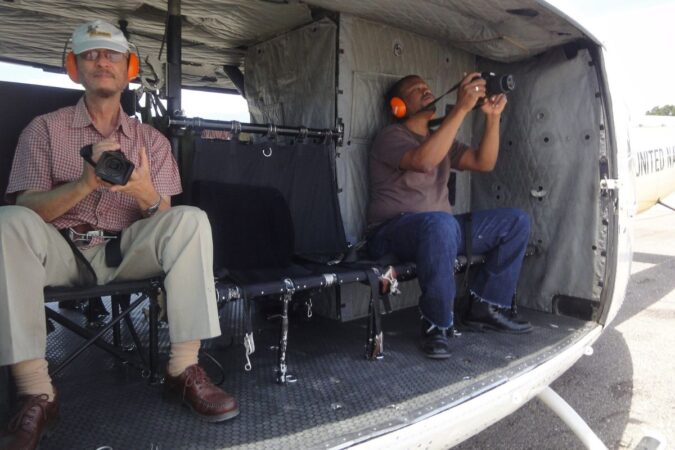
Arnold Antonin shooting a film from a helicopter. | ©Arnold Antonin Family Archives
With his documentary entitled « Thus Spoke The Sea » released in 2020, it deals with the riches of the environment in Haiti by recalling the need to rebuild the relationship between Haitians and the sea.
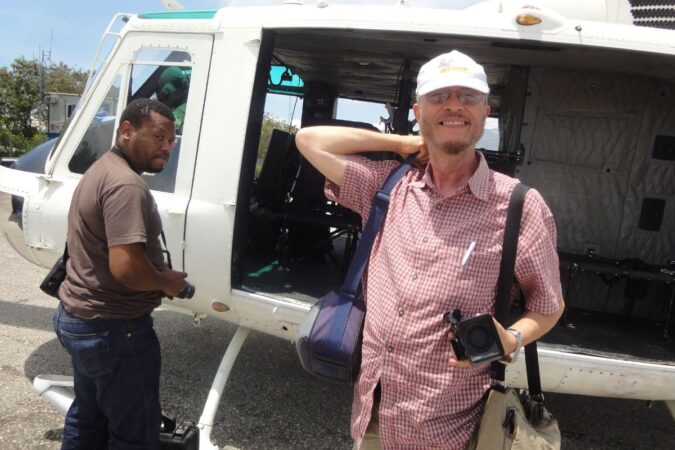
Arnold Antonin shooting a film from a helicopter. | ©Arnold Antonin Family Archives
With this documentary, the filmmaker received the Latin American prize for best medium-length film in 2022 at the 16th edition of the Sucre Human Rights Festival, in Bolivia.
On September 17, 2024, Arnold Antonin collected over 30 signatures from historians, anthropologists, and actors, including Jimmy Jean-Louis, Researcher Laënnec Hurbon and the recently deceased former Prime Minister Rosny Smarthe, around the Manifesto for the Environment and the Common Good.
In this six-page document obtained by AyiboPost, the signatories call for a constructive, peaceful, and democratic commitment to structuring collective and social life, steering towards concrete results for the entire population.
In 2022, the filmmaker received the Latin American prize for best medium-length film at the 16th edition of the Sucre Human Rights Festival, in Bolivia.
“ Audiovisual media in general, moving images and sound, remain a powerful tool for transmitting knowledge and values,” explains Antonin.
However, he remains aware of the ambivalent impact of cinema.
“Cinema can transmit as many good values as bad ones,” he admits.
Despite his productions, Arnold Antonin is aware of the challenges linked to the advancement of Haitian cinema.
“Producing films in Haiti with low budgets is a feat” recognizes the filmmaker, who nevertheless mentions that he benefits from the support of the Fondasyon konesans ak libète (FOKAL).
“My highest budgeted productions are « Le Président a-t-il le SIDA? », financed by the European Union and Canada, « The Loves of a Zombie » – financed at $75,000 – and « Thus Spoke The Sea, » funded by UN Environment,” he explains.
Most of his films are made on budgets of only $10,000 to $20,000.
“Far from the standards of neighboring countries like the Dominican Republic, whose minimum budget for a 52-minute documentary is $350,000,” explains the filmmaker to AyiboPost.
Challenges to financing film projects in the country persist.
“When I rely on funding from organizations, the process becomes very long. Sometimes you have to wait four or five years before completing a project. However, Haiti needs films all the time,” Antonin explains to AyiboPost.
“As for financiers,” he continues, “they only invest if it is profitable. However, today, there is no movie theater in Haiti, despite the enthusiasm of Haitians for their cinema.”
In 2008, Arnold Antonin took charge of the Association for the Fight Against Kidnapping (LUNAK). This association, made up of members of civil society and leaders of human rights organizations, advocated against this growing phenomenon at the time.
But in June 2022, his wife, Béatrice, an architect, was kidnapped from their home in Thomassin and subsequently released for ransom.
Despite these challenges, Arnold Antonin remains convinced that it is necessary to recreate a culture of the spirit in Haiti and train a new generation capable of acting to change the country.
“I have traveled to several countries, but Haiti is the only country where I feel comfortable. I love my country and I like living with Haitians. I stay here because I want to remain in solidarity with those who are no longer here and who sacrificed their lives for us,” Antonin concludes to AyiboPost.
Cover image: Arnold Antonin during the filming of “The Loves of a Zombie or can a Zombie be President? » in 2009. | ©Arnold Antonin Family Archives
► AyiboPost is dedicated to providing accurate information. If you notice any mistake or error, please inform us at the following address : hey@ayibopost.com
Keep in touch with AyiboPost via:
► Our Channel Telegram : Click here
► Our Channel WhatsApp : Click here
► Our Community WhatsApp : Click here

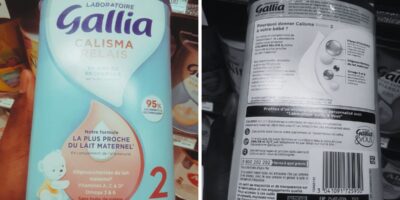

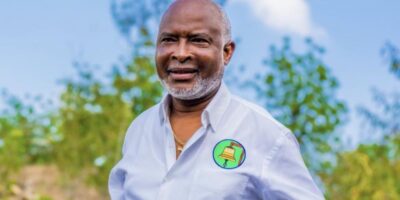
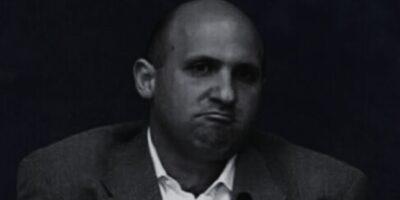


Comments